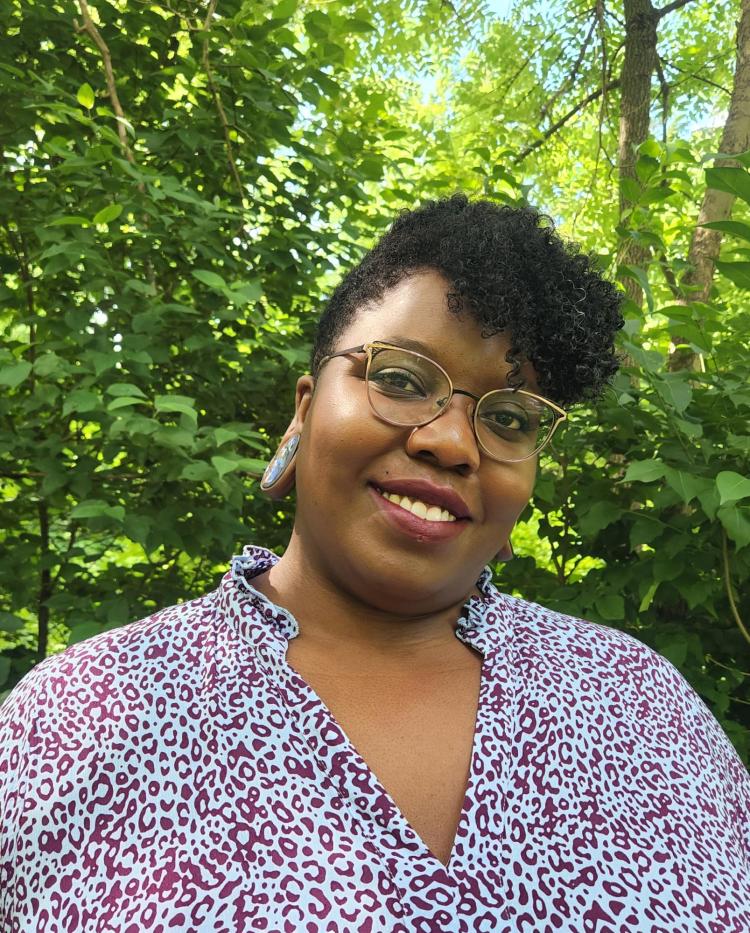Art scholar wants to make CU Boulder stand out in African diasporic studies
New art and art history professor wants to use their research on ‘Black pleasure’ in art to increase its prominence in the field
For cam nelson, a new assistant professor of art history at the University of Colorado Boulder who is comfortable with both she/her and they/them pronouns, it’s important that their work, rather than their persona, take center stage.
Inspired by the late bell hooks, an American author and social activist, nelson chooses to have her name spelled in all lowercase letters. They describe writing in typical Roman case format as “announcing oneself” and writing in lowercase as “whispering.” The choice could be seen as a reflection of nelson’s personality—understated yet compelling—but also committed to their work.
Nelson grew up in Rhode Island, one of three children to parents who worked as bankers—but that didn't stop them from pursuing more creative pursuits. Nelson’s late father was a DJ in college, and their mother played guitar, sang and wrote poetry. Because of their parents, nelson was always deeply immersed in the arts and was regularly taken to museums, theatre and ballet.

At the top of the page: "Sugar shack," painted by Ernie Barnes and seen here on the cover of Marvin Gaye's I Want You, is seen as an early example of Black Romantic art (david silver/Flickr). Above: cam nelson is a new professor in the Department of Art and Art History.
Growing up in a majority-white, Anglo-Saxon, Protestant community was another major influence on nelson’s life, later dictating how they wanted to show up in the world and be involved in their community. Recalling their experience being one of three black students in their entire grade, nelson says there was a lot of general abuse and bullying, but their parents served as strong examples for nelson and their siblings, never hesitating to assert their human and civil rights. Nelson’s parents always spoke up on behalf of the children and never doubted the family’s right to occupy space in that community.
After studying African and African American literature at University of Rhode Island, nelson spent a year in South Africa, where they were exposed to South African art. This informed their decision to pursue an MFA in photography from San Francisco Art Institute, followed by a PhD and MA in visual studies from University of California Santa Cruz. Their most recent work focuses on the visual culture of black pleasure and the aesthetics of safe space as depicted by painters labeled as “the black romantics.”
When nelson chose to focus on these subjects, they pondered how to respond to the discourse about Black existence. Nelson saw that discourse as dominated by Afro-pessimism, a framework that describes the continuing effects of slavery, racism and colonialism in the United States. While there are many truths to this framework, nelson saw it as exclusively associating blackness with slavery and death.
“I don’t wake up and see myself in that way,” nelson explains. “I experience joy and pleasure and happiness and, yes, I also experience anti-blackness. But that is not the sum of my existence.”
This sparked nelson to think about the term “black pleasure,” and whether such a term was an oxymoron. Specifically, nelson wanted to examine how black pleasure was depicted. Through this lens, nelson began studying the work of Annie Lee, an artist known for her depiction of African American everyday life. Nelson’s work grew from there and ultimately brought her to CU Boulder.
Of their choice to teach at CU Boulder, nelson says they were struck by the university’s serious commitment to diversity, equity and inclusion. But more than that, they’re excited for the opportunity to build a new area of focus in art and art history.
This semester, nelson is teaching a graduate seminar, The Black Female Body, and an undergraduate survey class, Black Art in America. Nelson says their graduate students seem keen to get deeper into the coursework, and the size of their undergraduate seminar class has grown greatly since the start of the semester.
Students “seem excited, like they have been wanting a class like this,“ says nelson. “I think they’re going to be all ears.”
Nelson hopes to create a substantial enough subject area here at CU Boulder that the department can recruit more students who are interested in African diasporic art and visual culture. For nelson, the goal is to increase the number of people teaching these subjects in the art history field—ultimately putting CU Boulder on the map as one of the country’s leading programs for African diasporic studies.

